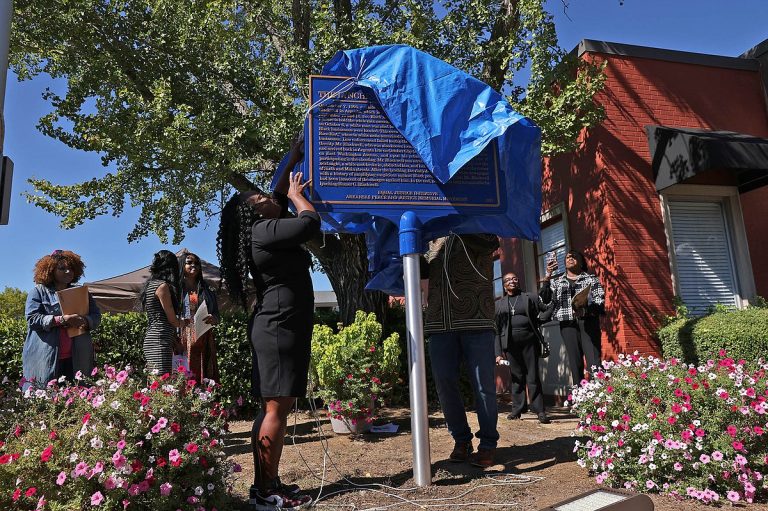On the 117th anniversary of the lynching of Homer G. Blackwell in North Little Rock, the Arkansas Peace & Justice Memorial Movement unveiled a historical marker at an intersection near Main Street, where he was killed.
“We’re here to recognize Homer G. Blackwell, who was known locally as Homer G. Blackman. We’re here to recognize his humanity,” said Kwami Abdul-Bey, co-founder of the Arkansas Peace & Justice Memorial Movement.
Blackwell was lynched after returning to North Little Rock, known as Argenta in 1906, after he was accused of shooting two white men, despite not being in the city in the days before his arrest, Abdul-Bey said.
The free-standing marker is the third to be erected in Arkansas and is sponsored by the Equal Justice Initiative. There are two historical markers in Pulaski County and one in Washington County that honor other lynching victims in the state.
Between 1865 and 1950, there are 493 documented cases of lynching, according to research from the Equal Justice Initiative and the Arkansas Peace & Justice Memorial Movement.
Several of the speakers at the ceremony talked about the state’s recent decision to eliminate Advanced Placement African American studies in course code catalogs.
“Our governor and other governors across the nation want schools and educators not to teach African American history. They call it indoctrination. Some even call it CRT [critical race theory].
“They also determined that they don’t want hate taught in our schools,” said Marie Hollowell, first vice president of the Arkansas Conference of the NAACP. “But when you look at that utility pole, imagine Homer G. Blackwell’s body hanging from that pole, or the bodies of over 4,000 men, women and children who were reported as being lynched in the United States. Who hated who? Why shouldn’t that history be taught?”
Despite Congress’ passing of the Emmitt Till Anti-Lynching Act in March 2022, which made lynching a federal hate crime, “the shamefulness and acknowledgement of lynching has yet to occur,” Hollowell said.
North Little Rock Mayor Terry Hartwick presented a proclamation officially naming Oct. 7 Homer G. Blackwell Day in honor of the marker’s unveiling.
In addition to the historical marker, the Arkansas Peace & Justice Memorial Movement is collecting signatures for a petition seeking that Sixth Street be renamed Homer G. Blackwell Avenue.
Though they only need 200 signatures from the North Little Rock community, their goal is to gather a “symbolic” 1,906 throughout the month of October, Abdul-Bey said.
The marker serves to not only honor Blackwell, but also to be educational for the city, said Rachel Patton, principal of North Little Rock Middle School.
“Today, the angry child within me delights that children today have an opportunity to learn a more complete history. … I’m excited that this historical marker will provide my students with tangible evidence of history that occurred here in their city,” she said.
“I look forward to students and teachers alike wrestling with the discomfort of knowing that, yes, even in our state and in our city, lynching occurred and profoundly impacted our community,” Patton said.
Performances by musician Joshua Asante and the Little Rock Writeous Poets were included in the ceremony. Jakira Franklin, a member of the Arkansas’ Writeous Poets and a high school student, read her poem, titled “I Wanna Know.”
“I don’t like how they want to take away a Black history class when it’s one of the most important classes I could have, a class I definitely want to pass because I want to know more about Black history, exact history, fact history. Not a side history, a live history, a wise history; it’s my history, is my history, is my history,” she read.
My Ly is a Report for America Corps member.




